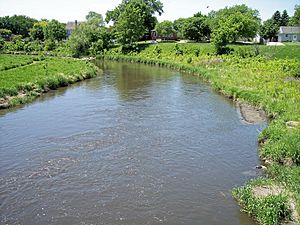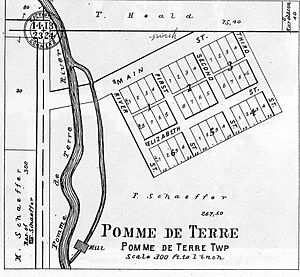Pomme de Terre, Minnesota facts for kids
Pomme de Terre was once a small town in Minnesota, United States. It is now an "extinct town," meaning it no longer exists. It was located in Grant County, in a place called Pomme de Terre Township.
History of Pomme de Terre
Pomme de Terre was the very first village to be settled in Grant County. This happened in 1868. Three people named Timothy Heald, Joseph Pennock, and Frank Smith started the settlement.
Timothy Heald officially planned the town in 1874. Its location was special because a stagecoach road crossed the Pomme de Terre River there. This road connected St. Cloud, Minnesota, to Fort Abercrombie.
In 1871, a store owner named N.Q. Puntches moved his shop to the village. Later, in 1873, Frank Williams and August Schaeffer built a grist mill. A grist mill grinds grain into flour.
This important mill burned down in August 1887. At that time, the mill was very busy. It was shipping out three train carloads of flour every week!
A post office served the town for many years. It was open from 1868 to 1879, and again from 1880 to 1902. At its busiest, Pomme de Terre had two stores, two blacksmith shops, a grist mill, and a grain elevator. It also had a hotel and a saloon.
In April 1873, the first county leaders for Grant County met in Pomme de Terre. They were called county commissioners. They met in N.Q. Puntches' store to choose where the county seat would be. The county seat is the main town for the county's government.
They decided not to make Pomme de Terre the county seat. Instead, they chose what is now Elbow Lake.
Several things led to the end of Pomme de Terre. The nearby town of Herman grew bigger. Elbow Lake became the county seat. Also, the railroad did not come through Pomme de Terre. It went north through Ashby instead. Because of these reasons, the village slowly disappeared.
Meaning of the Name
The name Pomme de Terre is French. It means "apple of the earth." This phrase usually refers to a potato.
However, in this case, it refers to a different plant. It means the prairie turnip (Psoralea esculenta). This plant has a root that looks a bit like a potato. The Sioux people commonly ate this root vegetable.
Images for kids
 | William M. Jackson |
 | Juan E. Gilbert |
 | Neil deGrasse Tyson |




